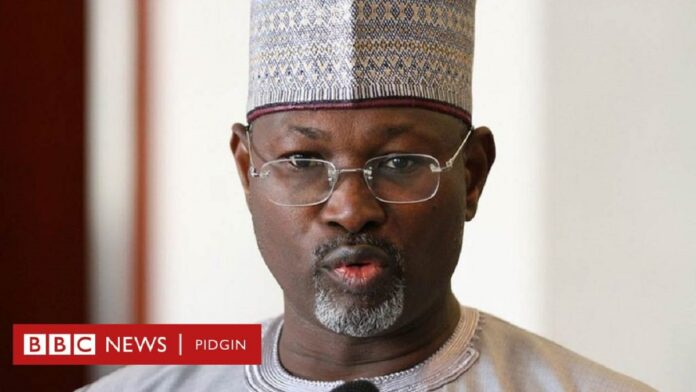From Ahmad SAKA,Bauchi
The former Chairman of the Independent National Electoral Commission (INEC), Professor Attahiru Muhammad Jega has advocated for the restructuring of the Nigerian federation before 2027, and to reduces the power of the Federal Government on resources
Professor Jega stated this when he delivered a lecture at the maiden (merged) convocation of the Bauchi State University, Gadau BASUG, in Gadau.
The theme of the lecture is : “Safeguarding Nigeria’s Future: Prioritizing Citizen’s Welfare and Security Amidst Challenges”.
Professor Jega said that he didn’t believe Nigeria is a failed state but “a failing state”.He said the restructuring of Nigeria should be embarked upon through evidence-based constitutional reforms, the objectives of which should be to deconcentrate powers and resources from the federal tier and to spread them to those of the state and local governments,” Jega urged the Nigerian leaders to learn from the “best practices” model federations, such as India, Canada and the USA in the areas of revenue generation and sharing and adapted to our local context and circumstances. “Just like the structure of the Nigerian federation, the structure of the Nigerian economy has a colonial origin, primary designed to meet up with, and satisfy, the economic interests of the colonial powers. Long after colonial rule has ended, the structure has embedded and integrated the Nigerian economy into the global capitalist system, such that it continues to promote primary commodity production, and export primarily to Europe, and import of finished products from all parts of the world, rather than commodity production through industrial production and manufacturing for both the home market and export. “No additional states and LGAs should be created. The additional resources current states would get from the deconcentration of power and resources as recommended above would make all the 36 states and FCT financially viable and facilitative of grassroots development. “The cost of governance at both the federal, state and local tiers of governance need to be drastically cut, and measures introduced to entrench transparency and accountability and effective anti-corruption oversight. “With regards to the structure of the Nigerian economy, the following recommendations are offered: Serious reform measures need to be introduced to diversify Nigeria’s earnings from dependence of export of crude oil, to expand investment in agricultural production and Agro-allied processing both for the home market and for export; and revive, expand and reposition our industries and manufacturing enterprises, for production, both for the home-market and for export,” he said. Professor Jega said that conceive of and pursue economic growth and people-oriented development strategies, independent of the influence of IMF and the World Bank, relying of implementable development plans, which are realistically implementable within delineated time-frame. He advised the government to reform the country’s fiscal and monetary policies to strengthen our productive enterprises, human capital and currency. Also, to conceive of and implement employment generation as well as entrepreneurship development strategies to help constructively address the youth bulge in Nigeria “Nigeria should become more actively involved in south-south cooperation and development initiatives. “With regards to addressing systemic and governance challenges, it is recommended as follows: Amend the Electoral Act 2022, so as to remarkably to improve upon the legal framework for future elections with integrity. In particular pay attention to reforming the role of political parties in the leadership recruitment and candidate selection processes. “Pursue reforms to improve and protect the integrity of the judiciary, as well as find a way of insulating them from the corruptive politics of electoral dispute resolution through litigation. “Improve the process of appointment into INEC with a view to protecting it from capture by crooked politicians and partisan pressures and influences. Strengthen and expand the scope of the work of anti-corruption agencies and institutions to mitigate the damaging impact of corruption in the Nigerian political economy. “Institute and initiate reform measures that would ensure not only substantial reduction in the cost of governance at all levels, but also effective and transparent preparation, monitoring and implementation of budgets, as well as policies and projects.”
Professor Jega, said the best way to safeguard Nigeria’s future is to have credible elections that are not hijacked by certain interests.
He said that credible election would ensure that only quality persons were voted into public office. Professor Jega said “If the reckless people are capturing the political process, the electoral process and government, and people just sit and watch, obviously they will destroy the future for everybody. So, constructive engagement is absolutely necessary; people have to get involved. “Citizens have an obligation in good or bad times. They have key roles to play in order to ensure their country survives and good things happen to ordinary citizens. “Ultimately the best way to safeguard Nigeria’s future and secure the welfare of citizens devoid of massive security challenges is to have elections with integrity, through an electoral process that is not captured. Unfortunately, now we are seeing that it is captured by reckless politicians. “An election that is not captured will bring out quality people, and as they become elected public officials and representatives who have positive value orientation in governance processes, the institutions will harness societal resources and deliver good quality services. “Only in this way can the state have the requisite legitimacy, stability, competence and capacity as well as resourcefulness to effectively address the needs of the people and safeguard the future of our country.” Professor Jega explained further that the state exists to, among other things, cater for the security, welfare and basic needs of the citizens. He stressed that no nation could survive without institutions to promote security and the well-being of its people. He said that “Any state that fails to do this in the modern context will be considered a failed state. Due to the resources ordinarily available to the state under normal circumstances, it should have the capacity and competence to address human security challenges and actually succeed decisively in doing so. “In this context, the Nigerian state needs to discharge these public obligations to its citizens because currently it is not discharging it. However, the citizens need to recognise that they have obligations of citizenship to their country and therefore have a significant role to play in shaping the present and safeguarding the future of Nigeria, because the tendency we are seeing now when people are withdrawing and doing sit-down-look doesn’t help.”



